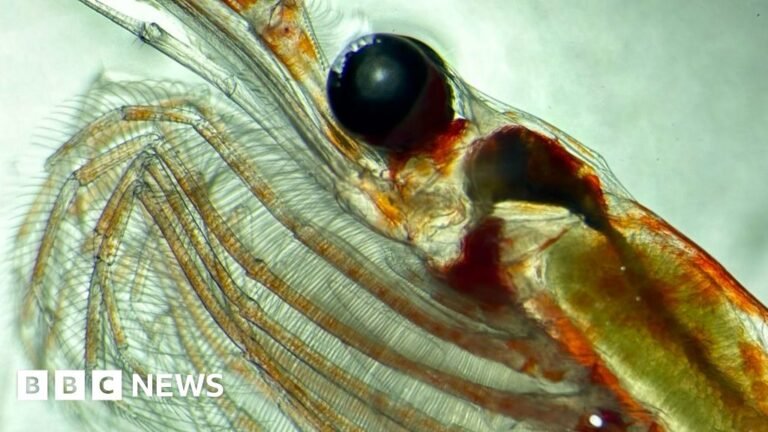Georgina Rannard
Climate and science correspondent
Prof Daniel J Mayor @oceanplankton
A tiny, obscure animal often sold as aquarium food has been quietly protecting our planet from global warming by undertaking an epic migration, according to new research.
These “unsung heroes” called zooplankton gorge themselves and grow fat in spring before sinking hundreds of metres into the deep ocean in Antarctica where they burn the fat.
This locks away as much planet-warming carbon as the annual emissions of roughly 55 million petrol cars, stopping it from further warming our atmosphere, according to researchers.
This is much more than scientists expected. But just as researchers uncover this service to our planet, threats to the zooplankton are growing.
Prof Daniel J Mayor @oceanplankton
Female copepods (4mm) with cigar-shaped fat stores in their bodies
Scientists have spent years probing the animal’s annual migration in Antarctic waters, or the Southern Ocean, and what it means for climate change.
The findings are “remarkable”, says lead author Dr Guang Yang from the Chinese Academy of Sciences, adding that it forces a re-think about how much carbon the Southern Ocean stores.
“The animals are an unsung hero because they have such a cool way of life,” says co-author Dr Jennifer Freer from British Antarctic Survey.
But compared to the most popular Antarctic animals like the whale or penguin, the small but mighty zooplankton are overlooked and under-appreciated.
Prof Daniel J Mayor @oceanplankton
This copepod has hair-like arms for feeding
If anyone has heard of them, it’s probably as a type of fish food available to buy online.
But their life cycle is odd and fascinating. Take the copepod, a type of zooplankton that is a distant relative of crabs and lobsters.
Just 1-10mm in size, they spend most of their lives asleep between 500m to 2km deep in the ocean.
Prof Daniel J Mayor @oceanplankton
Sacs of fat, or lipids, form in Southern Ocean copepods’ bodies and heads after they eat phytoplankton (the green material in the bodies in this image)
In pictures taken under a microscope, you can see long sausages of fat inside their bodies, and fat bubbles in their heads, explains Prof Daniel Mayor who photographed them in Antarctica.
Without them, our planet’s atmosphere would be significantly warmer.
Globally the oceans have absorbed 90% of the excess heat humans have created by burning fossil fuels. Of that figure, the Southern Ocean is responsible for about 40%, and a lot of that is down to zooplankton.
Prof Daniel J Mayor @oceanplankton
Millions of pounds is being spent globally to understand how exactly they store carbon.
Scientists were already aware that the zooplankton contributed to carbon storage in a daily process when the animals carbon-rich waste sinks to the deep ocean.
But what happened when the animals migrate in the Southern Ocean had not been quantified.
The latest research focussed on copepods, as well as other types of zooplankton called krill, and salps.
The creatures eat phytoplankton on the ocean surface which grow by transforming carbon dioxide into living matter through photosynthesis. This turns into fat in the zooplankton.
“Their fat is like a battery pack. When they spend the winter deep in the ocean, they just sit and slowly burn off this fat or carbon,” explains Prof Daniel Mayor at University of Exeter, who was not part of the study.
“This releases carbon dioxide. Because of the way the oceans work, if you put carbon really deep down, it takes decades or even centuries for that CO2 to come out and contribute to atmospheric warming,” he says.
Jennifer Freer
Dr Jennifer Freer analysed the zooplankton on board the Sir David Attenborough polar ship
The research team calculated that this process – called the seasonal vertical migration pump – transports 65 million tonnes of carbon annually to at least 500m below the ocean surface.
Of that, it found that copepods contribute the most, followed by krill and salps.
That is roughly equivalent to the emissions from driving 55 million diesel cars for a year, according to a greenhouse gas emissions calculator by the US EPA.
Prof Daniel J Mayor @oceanplankton
Plankton sampling often happens at midnight when the animals are closest to the ocean surface.
The latest research looked at data stretching back to the 1920s to quantify this carbon storage, also called carbon sequestration.
But the scientific discovery is ongoing as researchers seek to understand more details about the migration cycle.
Earlier this year, Dr Freer and Prof Mayor spent two months on the Sir David Attenborough polar research ship near the South Orkney island and South Georgia.
Using large nets the scientists caught zooplankton and brought the animals onboard.
“We worked in complete darkness under red light so we didn’t disturb them,” says Dr Freer.
“Others worked in rooms kept at 3-4C. You wear a lot of protection to stay there for hours at a time looking down the microscope,” she adds.
Prof Daniel J Mayor @oceanplankton
Antarctic krill (50-60mm) with green guts showing they’ve recently eaten algae
But warming waters as well as commercial harvesting of krill could threaten the future of zooplankton.
“Climate change, disturbance to ocean layers and extreme weather are all threats,” explains Prof Atkinson.
This could reduce the amount of zooplankton in Antarctica and limit the carbon stored in the deep ocean.
Krill fishing companies harvested almost half a million tonnes of krill in 2020, according to the UN.
It is permitted under international law, but has been criticised by environmental campaigners including in the recent David Attenborough Ocean documentary.
The scientists say their new findings should be incorporated into climate models that forecast how much our planet will warm.
“If this biological pump didn’t exist, atmospheric CO2 levels would be roughly twice those as they are at the moment. So the oceans are doing a pretty good job of mopping up CO2 and getting rid of it,” explains co-author Prof Angus Atkinson.
The research is published in the journal Limnology and Oceanography.
